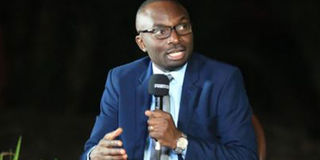Sacking of Bbosa shows that Ugandan football hasn’t learned its lessons well from Afcon 2021

Author: Robert Madoi is a sports journalist and analyst. PHOTO/FILE/NMG.
What you need to know:
- The only thing that is certain is that there are no clear winners from this episode
By most measures, the accusations levied at Wasswa Bbosa after Express opted to send him on gardening leave this past week are at once dizzying and far from unique. Bbosa, who has over the years built a reputation of selling his record even when it doesn’t exist, for once looked to have earned his stripes. Far from rushing to find a big pot of money, he was essentially handed a poisoned chalice after being unveiled at Wankulukuku in February of 2020.
Superintending over the Red Eagles with an unrelenting Red Army questioning your every action can be a consuming job. It would be a stretch to say that Bbosa discharged his duties with a sustained degree of civility. That has never been his style. All told, though, the sheer magnitude of the task he took on cannot be ignored.
To come even close to landing a league, cup and regional title treble as Bbosa did last season was – in a word – remarkable. He eventually had to settle with a league and Cecafa Cup double, which is no small beer. While it is true that the danger was to imagine that this helped confer convening power on the mercurial coach, the manner in which his relationship with Express imploded so spectacularly was odd. That the proverbial pink slip was handed on Valentine’s Day only succeeds in spinning a preposterous plot.
As the reigning Ugandan champions, Express’ stop-start form this season had become increasingly impossible to ignore. The club looked in terminal decline. And, in a sense, it still does. But it also appears the Red Eagles chief executive, Isaac Mwesigwa, was alone in his sense of terror. He claims all the red flags and check boxes regarding bringing the club’s brand into disrepute had been ticked by Bbosa. A long-standing feud between the two – Mwesigwa and Bbosa – has, however, been severally mentioned. Indeed, an either/or situation was created after the two parties increasingly struggled to find common interest.
In truth, it is hard to know precisely how bad things are or perhaps have been at Wankulukuku. Explanations about what made the mood turn against Bbosa have ranged from anything from an outsized ego to even, you’ve read it right, sorcery! The only thing that is certain is that there are no clear winners from this episode.
One of the feel-good stories that came out of the recently-concluded Afcon 2021 was African coaches putting their best foot forward. An impressive 15 of the 24 head coaches that patrolled dugouts in footballing cathedrals that dotted different Cameroonian cities at the continental showpiece were native to the country they were leading. While Aliou Cisse (Senegal) went all the way, Kamou Malo’s influence on Burkina Faso’s fourth place finish was undeniable.
Unsurprisingly, following the aforesaid feats, there has been a groundswell of support for Ugandan coaches. An investment of trust from Fufa has been widely recommended by a number of stakeholders. This, though, will never see the light of day if the clear sense of urgency at club level is such that authorities show little tolerance to coaches.
The marking of a new iteration will remain a pipe dream if the peculiarities of our coaches – of which they number in legions! – continue to be viewed with an air of repulsion.
Senegal’s FA resisted the temptation to do this. In so doing, its allowance for peculiarities – even failures – ensured that the innovation squeezed out of Cisse was anything but incrementalist. This is something Ugandan football would do well learning at both international and club levels.
Email: [email protected]
Twitter: @robertmadoi



